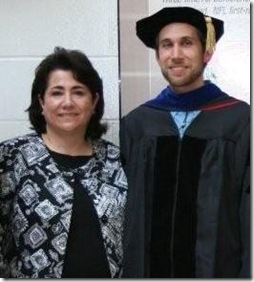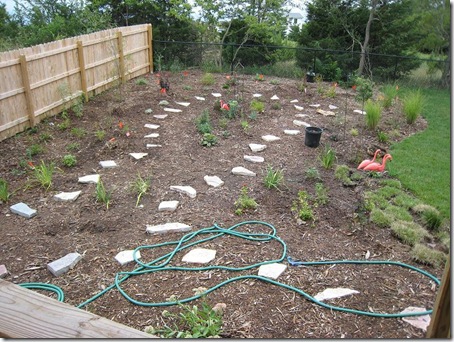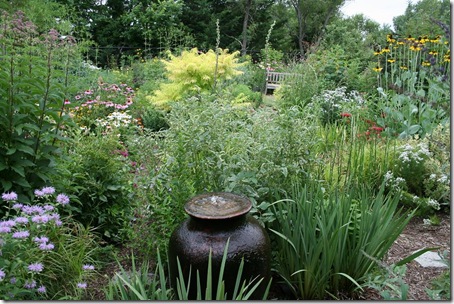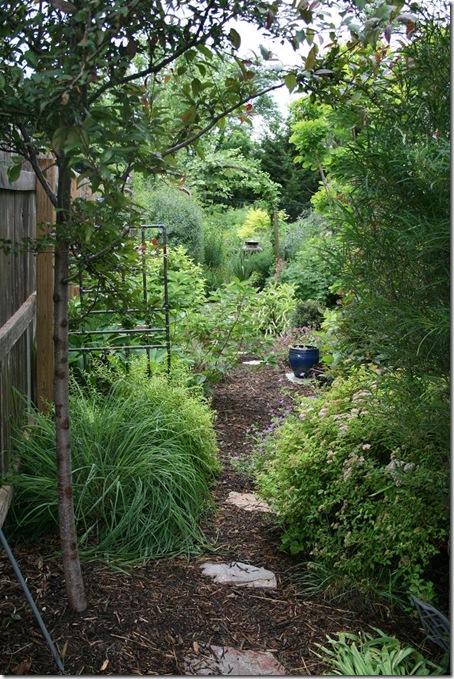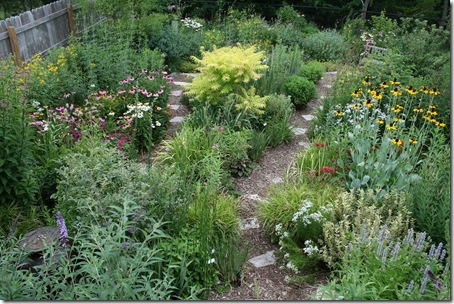Benjamin Vogt lives in Lincoln, Nebraska where he writes and gardens and garden coaches. He has a little memoir entitled Sleep, Creep, Leap: The First Three Years of a Nebraska Garden, and blogs at The Deep Middle. Visit him at his main website, bevogt
As a lot of you already know, Ben is an exquisite writer…both his poetry and non-fiction. I’m delighted that he’s participating in this series. Fran Sorin
Did your mother pass down any stories about herself, family members, neighbors, etc. that have to do with gardening?
My mother loved to visit her grandmother’s home. There she learned to pick and can vegetables, admired morning glories, and swung beneath a large weeping willow. It is then no surprise that some of her favorite plants include morning glories and willows, which she has begun planting in earnest around her new home.
Knowledge of the above certainly wasn’t just handed out. In my family, silence is the norm. Not library silence, but free giving up of information is something that is earned with age and time. But even more so, such stories and knowledge come from my mother connect—with a tough sinew—to a history of childhood abuse and poverty. I’m sure one reason my mother connected so deeply with the plants of my great grandmother’s house must surely be that it was an escape from her stepfather, and a home where she was a second mother to four younger siblings.
When I began writing a book about gardens, I waited until the very end to ask my mom about her childhood. Many stories were about strict churches, alcohol, and mending passed-down clothes alongside those of roses and hydrangea. It was hard to hear these things, and harder for my mother to speak about them. In the act of gardening with her as a child, and now as an adult writing a book, the distance between flower beds and homes, chloryphyl and blood, are miniscule at most.
If your mother worked in the garden, what did she teach you about gardening?
I remember gardening with my mother from about the age of 13 to 18. And gardening was often just manual labor, like cleaning up debris. Yet I also got bored being inside the house, so I’d often run across my mom outside in her garden puttering around, and would talk to her a few minutes, or sit nearby watching her or the maple trees above the lake. I had to be careful not to disturb her for too long because I felt she was in her zone.
Whenever we actually planted together, I had specific plants for specific places. My instruction was to put this coreopsis in the spot it was resting above. My mother would then disappear to do something else. Her space was hers, and mine was mine. My being outside was at once both an invitation and a rebuke. This is the duality of the garden I learned most, perhaps of nature tooth and claw. I didn’t learn about perennials or digging holes or propagation or foliar diseases, just that outside you were both more at home and less at home than being snuggly beneath your blanket during a winter snowstorm.
If not, was there one person or a few individuals that did teach you about gardening? What did they pass onto you? When I went to college in 1995 I lost nature. It remained lost until 2003 when I got my first home and my parents helped me move in—my mom orchestrating the planting of a very small flower bed out my front door and comparing child investment accounts. As quickly as the bed went in, she was gone, and I had to fend for myself.
I learned this self reliance so well that, when I got married in 2007 and began my own much larger garden at the new house, I’d spend as much time reading horticulture books and surfing websites as I did planting. I’d like to think I know more about gardening now than my mother does, but I tend to overthink design and plant selection, so my garden—at least right now—can never be anything like my mom’s more emotional space and idea of a garden.
What did your mother teach you in other areas of your life?
My mother taught me not to take bull, to look out for myself yet be considerate of others. Most importantly, she taught me to never give up. I send out essays and poems to literary journals and contests and book manuscripts to publishers, and rejections can come one a day or six a day. When it happens I steam and stew and yell, then a few hours later a pile of envelopes is stacked by the front door ready to go out again. I’m a rejection junky. Similarly, when a plant dies in the garden, I plant it again. And sometimes again, in the same place. And they all die. So I plant it somewhere else, and it dies. Or it may even thrive. I’m stubborn. I know who I am in the context of my failures, desires, and denials—and sometimes by my successes and acceptances. My mother taught me to follow my passions, and cultivate true, deep friendships with only a few worthy people who would not vanish like annuals in the garden at the end of the year. And yet, my mother loves petunias.
Do you think of yourself as creative? How does it come through in your garden and in life?
Very creative. I spent 13 years in higher education studying literature and writing poems and stories and essays galore. I also am a pretty emotional person, so one minute I’m laughing and jovial, and the next I’m serious or melancholy, or downright angry. As my imagination ebbs and flows I evolve minute by minute, like some mood ring I suppose. If I don’t express myself in some creative way each day, I feel self destructive. So if I can’t write, I garden. If I can’t garden or write, I read. If I can’t do any of those I daydream. I’ve forgotten how to daydream as an adult, and I’m trying to reteach myself the power of still reflection, losing myself in a place and time without moving or talking. No music. No internet. No distraction so that I realize just how distracting the world really is. My mind races. I’d say that when I’m “distracted” I’m imprisoned like a caged songbird. Van Gogh mentioned something like this in his letters. If I can spend 30 minutes sitting in my reading chair staring at the ceiling, I’m a new man. I’m supercharged. We like to think the distance between our physical and metaphysical selves is great and distinct, but it is a grey area we wear like an aura or afterimage. Every movement, thought, action, and sound is creative act. Sweeping is a creative act. Driving to work. Filing papers. Walking to lunch. This virtual ink.
Describe you own garden as you see/feel it? Do you think it reflects who you are? My garden is a reflection of devotion, persistence, and defiance. No one in my neighborhood plants trees or flower beds. In four years I’ve quintupled the amount of wildlife in my ¼ acre of suburban sprawl. I’ve unleashed parts of myself I’ve denied, that we all deny. I’ve been most afraid of myself and the world, and most in love, in the garden. Perhaps my fondness for tall herbaceous perennials is the best symbol—plants that die back each year, but put on six, ten, fourteen feet of growth in one season. I pierce the sky gods and call the world home with my beckoning blooms, then am humbled and rebuilt in a new image.

